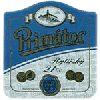Pivovar Náchod - Primátor Rytírský Blond Doppelbock
-
ABV:
9.00% -
Serving Temperature:
42-47° F -
Suggested Glassware:
Pint Glass, Goblet or Flute
Primátor Rytírský Blond Doppelbock has the alcohol volume of a doppelbock, though it's not a traditional doppelbock in the conventional sense. It carries the name more because of the high alcohol content, but this particular style of beer is most often referred to as a European (or Euro) Strong Pale Lager. These are essentially stronger versions of pilsners, brewed with massive malt quantities yielding a much higher alcohol content. The use of only malts (as opposed to adjuncts such as corn or rice, as is common in the USA) distinguishes these beers from "malt liquor". Unfortunately, all beers marketed in the USA above a certain ABV are required by law to be labeled as "Malt Liquor"—which explains the appearance of these (dirty little) words on the label of this beer. The nose is quite fruity—melon like—with notes of baked apples and light floral tones. Expect a sweet flavor with spry carbonation, distinctly melon-like flavors and subtle notes of grape skins and chardonnay. Hop bitterness comes in late to dry out the sweetness, though sweet notes prevail. So, what's in a name? Rytírský is Czech for "Knight's" (or knightly/chivalrous). Drink more than one of these in a sitting, and it's "good night", as these babies pack quite a punch. Enjoy as a digestif after a hearty meal.
The Bohemian brews we've sent you have been crafted by Czech beer artisans who possess an appreciation of beer unlike that of any other nation in the world. After the split of Czechoslovakia in 1993, the Czech Republic (having a total area just smaller than the state of South Carolina) achieved a major beer victory: first place in beer consumption per capita (many Slovaks prefer to drink wine and thus pulled down the per capita values prior to the split). The results from a 1998 study completed by the German Brewers Association showed that the Czechs were not only number one in this ranking; they were number one by a large margin. The study revealed that, per capita, the Czech people drink approximately 334 U.S. pints per year! That's about a beer a day per man, woman and child (and if you consider that the youngsters probably aren't tossin' back too many of those pints, that's a heck of a lot of beer).
This proud heritage of brew drinking has a long history. Local agricultural conditions are ideal for growing hops, and their cultivation in Bohemia has been chronicled as far back as 859 A.D. These hops were exported to Germany via the Elbe River to the Hamburg hops market in 1101, and to this day the world still cherishes Bohemian Saaz hops.
The first documented account of home-brewing in the Czech territories dates back to 1088, and the first Czech brewery was born in the town of Cerhenice in 1118. The U Fleku microbrewery in Prague has been in operation since 1499! Put that in historical perspective by considering that Columbus discovered the new world just seven years prior!
This month's featured international brewery, Pivovar Náchod (pivovar means brewery in Czech), was founded in 1871, making it a relatively "young" brewery if you can believe it. Within two years the Náchod townspeople enjoyed beer from the first brewing. The popularity of Náchod's beer grew steadily enough over the following 50 years to mandate enlargement of the brewery between 1925 and 1930. However, with the invasion of the Third Reich on March 15th, 1939 many Czechs were drafted to work in coal mines, the iron and steel industry, and armaments production. Consumer goods production, dramatically abridged, was largely directed toward supplying the German armed forces. Within 4 years, all non-war-related industry was prohibited, halting the brewery's (and the industry's) development until after World War II.
Later, under Communist rule, very little was invested into the country's breweries. On the upside, however, beer was very cheap. This helped establish beer drinking as perhaps the single most popular hobby among Czech men. One of the Czech Republic's most famous beer drinkers, the protagonist of Jaroslav Hasek's novel "The Good Soldier Svejk" proclaimed that the government that raises the price of beer is destined to fall within one year. In 1984 the Communists almost doubled the price of beer. Though off by four years, The Good Soldier's prognostication was fulfilled. These days, Czech beers command top dollar from the many foreign countries that import them, and this has permitted prices to stay low for the locals.

Unmatched Variety by style, brewery & country
Choose from Five different Beer Clubs offering unmatched variety by brewery,
country of origin, and beer style to suit your specific tastes.


